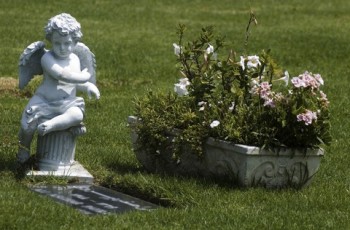 What a tragic story out of Warren, Ohio. A father left his 3-day old baby alone in her bassinet while he briefly left the room.
What a tragic story out of Warren, Ohio. A father left his 3-day old baby alone in her bassinet while he briefly left the room.
Their family dog, a Husky, apparently thought the child was a stuffed animal or toy and picked her up, killing her due to a cardiac arrest.
This highlights the need to constantly supervise your dog when there is a baby in the house. It only takes a second for a dog to make a mistake and harm or even kill your precious newborn.
Below, some expert advice on helping your dog adjust to a new baby in the house.
Before you bring the baby home, make sure your dog is trained to obey your commands, particularly related to mouthing behavior, such as teething and “play” biting. Begin gradually reducing the amount of time you spend with your dog. Starting this early in the pregnancy allows you to do it gradually so the dog does not associate the arrival of the baby with the loss of your attention.
If you have friends who have recently had babies, introduce your dog to their babies, while keeping your dog on the leash, just in case. If the dog is not behaving, remove him immediately from the situation. If he does well, reward him with affection and treats.
Start child-proofing your dog by poking, pinching, hugging, and even pulling his tail. Start gently, then increase the level of intensity. Do this while you are feeding him a treat, so he begins to associate the slight discomfort of the poking with the pleasure of eating a treat. At other times, run through the house screaming for no reason at all. (Those of you who are already parents are laughing at this one, I know.)
Make sure your dog doesn’t react badly to people reaching for his food by putting your hand down and dropping a few treats into his food while he is eating. Again, the idea is to get your dog to associate something pleasant with something that would otherwise freak him out.
While you are decorating the nursery, set up a small area in one corner for your dog. Praise him when he lays quietly in his designated area.
If your baby will remain in the hospital for a day or two, the new daddy should bring home a blanket that has previously been wrapped around the child. Have the dog sit, then give him a treat and allow him to sniff the blanket. Do NOT allow him to play tug or otherwise be rough with the blanket.
When you bring the baby home, introduce the dog to your new bundle of joy. Keep your dog on his leash for the first couple of encounters and reward him for acting appropriately while investigating this new member of the pack. If he attempts to bark or to paw or nudge the baby, immediately put the dog up. He will soon learn what is acceptable and what isn’t.
Above all, NEVER leave your dog alone with your baby. Even if your dog is old. Even if your dog is well-trained. Even if your dog is little. Even if your other children are crying in the other room. There is nothing that is so important that you should risk the safety of your child.
More information on this topic can be found here.
Until next time,
Good day, and good dog!

Jennifer – Thanks so much for sharing this site. There is so much information there, including YouTube postings of videos, showing everyone what to look for when your dog is interacting with your baby. Should be required viewing for anyone who is around both babies and dogs.
This is the third incident in less then 3 weeks and indeed is beyond sad. The unfamiliarity of a new baby in a home puts babies at a heightened risk and it is so important that at no time the baby is left unattended without awake full adult supervision when a dog is near. My heart goes out to these families and our program is dedicated to helping prevent families from going through this and similar tragedies. http://www.dogsandstorks.blogspot.com has helpful information and podcasts for all new and expecting families as well as ongoing support. We need to keep offering resources and education long after baby arrives. I only hope we can help prevent this in the future.